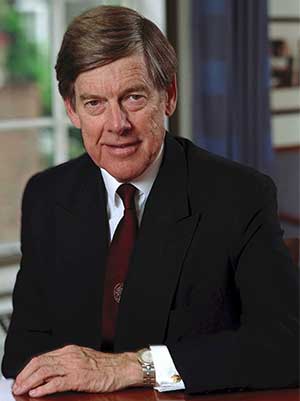Alec Broers played a significant role in the University of Cambridge’s rise as a major economic force and centre of excellence for high technology. He was Vice Chancellor between 1996 and 2003. He always expressed strong views about the role of engineers in society, considering that any artificial barrier between engineering and the rest of science is just as damaging as the perceived division between the arts and sciences. He saw engineering and science as two sides of the same coin and believed the Royal Academy of Engineering was ideally placed to drive home this message.
Lord Broers spent nearly 20 years of his career in research with IBM in the US, working at the Thomas J Watson Research Centre in New York, the East Fishkill Development Laboratory, and at the company’s corporate headquarters.
When he arrived back in Cambridge, Lord Broers set up a nanofabrication laboratory to extend the technology of miniaturisation to the atomic scale. He also developed his research on using electrons, X-rays, and ultraviolet light in microscopy and on making microelectronic components.
Lord Broers served on numerous national and international committees, including the Engineering and Physical Sciences Research Council, the Foresight Panel on Information Technology and the NATO Special Panel on Nanoscience. He was also a member of the government’s Council for Science and Technology. He was elected a Fellow of the Royal Society in 1986, of the Fellowship of Engineering in 1985, and became a Foreign Member of the US National Academy of Engineering in 1994.
He has served on the Board of Directors of Vodafone and of RJ Mears LLC. In March 2004 he joined the Board of Plastic Logic as Non-Executive Chair and in December of the same year became Chair of the House of Lords Science and Technology Committee.
On 21 June 2004, Her Majesty Queen Elizabeth II made him a life peer in recognition of his contribution to engineering and higher education.

Lord Broers
- 1938 Born 17 September in Calcutta
- 1959 Following education at Geelong Grammar School, graduates with a degree in physics from the University of Melbourne
- 1962 Graduates in electrical sciences from the University of Cambridge after arriving initially as a choral scholar
- 1965 Completes PhD research at University of Cambridge
- 1965 Starts work as a researcher at IBM USA, later becoming an IBM Fellow and serving on the Corporate Technical Committee
- 1984 Returns to Cambridge as professor of electrical engineering
- 1990 Becomes Master of Churchill College, Cambridge
- 1992 Appointed Head of the University of Cambridge’s Department of Engineering
- 1996 Appointed Vice Chancellor, University of Cambridge
- 1998 Knighted for services to education
- 2001 Appointed President of the Royal Academy of Engineering
- 2004 Granted a life peerage as Baron Broers of Cambridge
- 2004 Appointed Chair of the House of Lords Science and Technology Committee
- 2012 Becomes inaugural Chair of Judges, Queen Elizabeth Prize for Engineering
